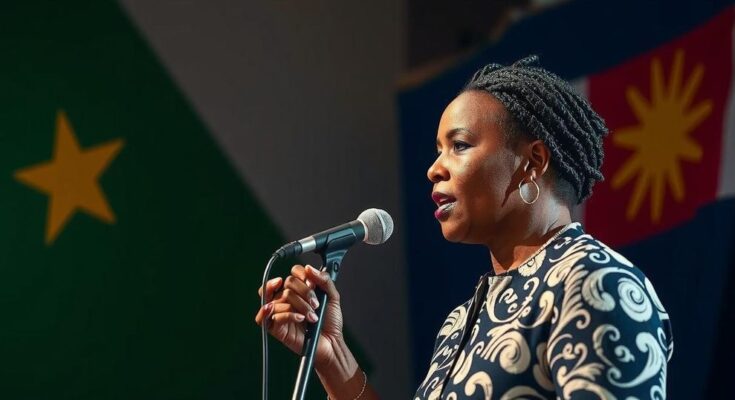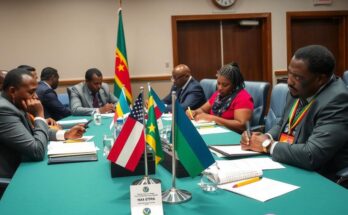Namibia has elected its first female president, Netumbo Nandi-Ndaitwah, who won 57% of the vote despite controversial electoral processes. Her ruling SWAPO party retained a slim parliamentary majority amidst regional trends of political change and dissatisfaction among voters. Nandi-Ndaitwah pledges to focus on peace and youth empowerment while opposition parties raise concerns about the integrity of the election.
Namibia has marked a significant milestone in its political history as Vice President Netumbo Nandi-Ndaitwah was elected as the nation’s first female president. The announcement came following a presidential election that faced numerous challenges, including technical difficulties and extended voting periods to accommodate ballot shortages. Despite these issues, the 72-year-old leader won 57% of the votes, defying expectations of a runoff election.
Her ruling party, SWAPO, retained its parliamentary majority, albeit by a narrow margin, further extending its grip on power since Namibia’s independence in 1990. The elections were marred by controversy; opposition parties claimed the extended voting period was unconstitutional, which prompted them to consider legal action to contest the results.
Nandi-Ndaitwah’s ascendance marks an essential moment for female representation in Africa, as she takes on the role of only the fifth president since independence. Having been a part of Namibia’s independence struggle in the 1970s, she brings a wealth of experience to her new position, having previously served as vice president. This election, however, reflects an undercurrent of discontent among voters, particularly young people facing economic challenges and high unemployment.
The SWAPO party’s electoral performance has been described as its worst in history, and it follows a regional trend of political change, with several long-ruling parties in neighboring countries experiencing similar setbacks. In her victory speech, Nandi-Ndaitwah emphasized a commitment to peace and empowerment of youth, stating, “We are going to do what we promised you during the campaigns.” Opposition leaders are calling for reforms and legal challenges in response to the election’s management, reflecting potential shifts in Namibia’s political landscape.
The context of Netumbo Nandi-Ndaitwah’s election as Namibia’s first female president is shaped by a series of political dynamics both within the nation and the southern African region at large. Namibia, home to approximately 3 million citizens, has enjoyed a reputation for stability and democratic processes since its independence from apartheid South Africa in 1990. However, recent electoral challenges have raised concerns regarding electoral integrity and public trust in democratic institutions. The SWAPO party, while historically a dominant force since independence, has faced growing discontent due to various socio-economic issues, particularly among younger demographics. This election signifies not only a breakthrough for female leadership but also indicates an era where voters are increasingly wary of long-standing political establishments. Nandi-Ndaitwah’s victory amidst reported electoral irregularities offers both hope and skepticism for the future governance of Namibia.
In conclusion, the election of Netumbo Nandi-Ndaitwah as Namibia’s first female president represents a historic achievement not only for the nation but also for women’s leadership on the African continent. Despite the celebration surrounding this milestone, the controversy surrounding the electoral process reflects broader issues of governance, transparency, and public trust. Political stability and responsive leadership will be crucial as Namibia navigates an evolving political landscape marked by calls for change and community empowerment.
Original Source: www.seattletimes.com




